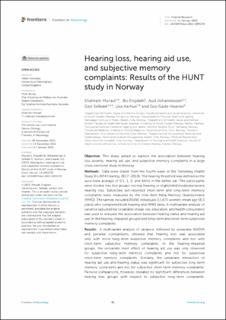| dc.description.abstract | Objective. To study the association between hearing loss severity, hearing aid use, and subjective memory complaints in a large cross-sectional study in Norway. Methods. Data were drawn from the fourth wave of the Trøndelag Health Study (HUNT4 Hearing, 2017–2019). Hearing threshold was defined as the pure tone average of 0.5, 1, 2 and 4 kHz in the better ear. The participants were divided into five groups: normal hearing or slight/mild/moderate/severe hearing loss. Subjective self-reported short-term and long-term memory complaints was measured by the nine-item Meta-Memory Questionnaire (MMQ). The sample included 20,092 individuals (11,675 women, mean age 58,3 years) who completed both hearing and MMQ tasks. Multivariate analysis of variance (adjusted for covariates of age, sex, education, and health cofounders) was used to evaluate the association between hearing status and hearing aid use (in the hearing-impaired groups) and long-term and short-term subjective memory complaints. Results. Multivariate analysis of variance, followed by univariate ANOVA and pairwise comparisons showed that hearing loss was associated only with more long-term subjective memory complaints and not with short-term subjective memory complaints. In the hearing-impaired groups, the univariate main effect of hearing aid use was only observed for subjective long-term memory complaints and not for subjective short-term memory complaints. Similarly, the univariate interaction of hearing aid use and hearing status was significant for subjective long-term memory complaints and not for subjective short-term memory complaints. Pairwise comparisons, however, revealed no significant differences between hearing loss groups with respect to subjective long-term complaints. Conclusion. This cross-sectional study indicates an association between hearing loss and subjective long-term memory complaints, but not with subjective short-term memory complaints. In addition, an interaction between hearing status and hearing aid use for subjective long-term memory complaints was observed in hearing-impaired groups, which calls for future research to examine the effects of hearing aid use on different memory systems. | |
